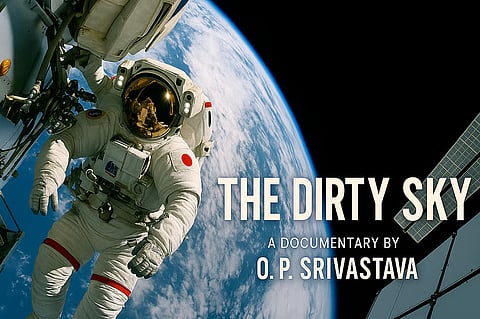

“We have polluted everything — our rivers, seas, air, mountains. The only thing left was the sky. But it too is now dirty,” says filmmaker OP Srivastava. “Once, you could look up and feel refreshed. Not anymore. That dirt is soon going to fall on our heads.”
Srivastava’s latest documentary, The Dirty Sky, was screened at the India International Centre (IIC) on Wednesday. The 73-minute documentary exposes the fast-growing crisis of orbital pollution. An outcome of extensive research, expert commentary, and graphics and visuals, The Dirty Sky explores how defunct satellites, broken rocket parts, and fragments of past collisions have reduced the earth’s orbit into a junkyard.
Banker to filmmaker
Srivastava started filmmaking after retiring from banking. After he retired in 2013, he decided to devote the remaining years of his life to his passion — filmmaking. His admiration for filmmakers such as Mrinal Sen, Satyajit Ray, and Girish Kasaravalli powered his passion. A short course at the Film and Television Institute of India (FTII) and mentorship under Kasaravalli helped him find his way to become a documentarian. Additionally, Srivastava’s debut feature, Life in Metaphors: A Portrait of Girish Kasaravalli, also went on to win the National Award for Best Biopic in 2015.
Today, Srivastava has made around ten films dealing with issues — like Alzheimer’s, brain cancer, environmental decay, and others — that he feels deserve public attention.
A hidden crisis
“I read a small news item about two satellites colliding in space and debris falling towards earth,” Srivastava tells TMS, speaking about the inspiration behind the documentary. “That triggered my curiosity and I started studying the issue. Soon I realised that the world is very cagey about it. Nobody wants to admit that the sky above us is getting dangerously polluted.”
Over three years, Srivastava researched for the film, contacting multiple space agencies including NASA, European Space Agency (ESA), and ISRO. “Except for ESA, everyone was circumspect,” he said. “Even if they were developing technology to address it [removal of space junk], they wouldn’t talk about it.”
The film highlights the concept of the “Kessler Syndrome” — where one satellite collision leads to another, leading to a chain reaction that could leave certain orbits unusable for decades. The documentary also shows the legal grey zones that make cleanup efforts nearly impossible.
“Under international law [or the 1967 Outer Space Treaty], space debris remains the property of the country that launched it. So if a piece of debris belongs to China, I, as an Indian, cannot touch it,” Srivastava explains. “There is no legal framework that allows anyone else to clean it up. So it becomes nobody’s baby.”
A moral failure
According to Srivastava, the cluttered space is the result of human greed and neglect. “All these rich nations are spending billions to go to Mars or the Moon to mine rare elements. But they aren’t bothered about the debris floating above our heads,” he remarks, disappointed. “The race for resources has blinded us to sustainability. If the cascading effect starts, the whole world could end… then what will we do with all those rare earth metals?” he asks.
The film uses global footage and expert voices to show how space debris is being tracked like pollution levels on Earth. The purpose of the documentary, as per its creator, was to make people aware, and to get the common man talking about it. “Governments won’t act unless people raise their voice.”
Struggles of a documaker
Despite the urgency of this subject, Srivastava says it is quite difficult to get people to watch documentaries in India. “Everybody wants to watch Bollywood,” he adds. “I have put in four years of my life and my own money into this film, but there are no proper platforms to show it.”
“If this was a Bollywood film, all the large multiplex cinemas would grab it,” he continues. “But for documentaries, there is no ecosystem. No screens, no funding, no government support. Internationally, small auditoriums and public spaces regularly host such screenings. We don’t have that here.”
However, Srivastava is undeterred. “I’ve taken a pledge that till I’m alive, I will continue to make films that matter,” he stresses.
Although, The Dirty Sky ends on a note of awareness, Srivastava himself admits he isn’t very hopeful, and a perfect solution may still remain out of reach for the time being. “I’m not optimistic about it,” he says. “The world’s priorities are still dictated by greed and power.” But, Srivastava believes that the common man can make governments change. “Journalists, students, young people — they have to take it forward.”
(Written by Pankil Jhajria of The New Indian Express)
